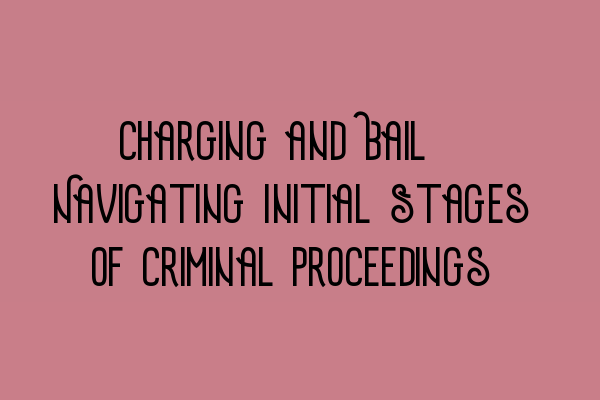Charging and Bail: Navigating Initial Stages of Criminal Proceedings
Welcome to the SQE Criminal Law & Practice Law UK blog! In this article, we will explore the crucial stages of charging and bail in criminal proceedings. These initial stages can significantly impact the outcome of a case, making it essential for legal professionals and aspiring lawyers to understand the intricacies involved.
Understanding Charging in Criminal Proceedings
Charging is the formal process of accusing an individual of committing a criminal offense. It is a vital step in criminal proceedings and involves evaluating the evidence gathered by law enforcement agencies to determine if there is sufficient basis to bring charges against the accused.
One important aspect of charging is the standard of proof required. The standard of proof in criminal cases is “beyond a reasonable doubt.” This means that the evidence presented must indicate that the accused is guilty to a moral certainty. It is crucial to have a thorough understanding of the elements of the criminal offense and the evidence supporting the charges.
If you’re preparing for SQE 1 and want to test your knowledge on criminal law concepts, check out our SQE 1 Practice Exam Questions article.
Significance of Bail in Criminal Proceedings
Bail is the release of an accused person from custody, with or without the imposition of certain conditions, pending trial or further proceedings. It is an important consideration at the initial stages of criminal proceedings as it balances the protection of society’s interests with the presumption of innocence.
The decision to grant or deny bail is based on several factors, including the severity of the offense, the accused’s criminal history, the risk of flight, and the potential danger the accused may pose to the community. Bail conditions, if imposed, may include surrendering of the passport, regular reporting to the police, or electronic monitoring.
For SQE 2 candidates looking for comprehensive preparation courses, be sure to check out our SQE 2 Preparation Courses article.
Navigating the Initial Stages of Criminal Proceedings
The initial stages of criminal proceedings can be complex and overwhelming. It is essential to have the guidance of an experienced legal professional who can navigate through the various aspects effectively. Whether you are a solicitor, an aspiring lawyer, or a student preparing for the SQE 1 examination, a solid understanding of charging and bail is crucial to success.
To strengthen your understanding of the legal system and enhance your chances of success in the SQE 1 examination, our SQE 1 Preparation Courses offer comprehensive study materials and mock exams.
It is important to stay up-to-date with the latest developments in criminal law. If you are interested in the upcoming SRA SQE Exam Dates, be sure to check out our article on SRA SQE Exam Dates.
Remember, charging and bail are pivotal stages in criminal proceedings, and having a solid grasp of the concepts involved can enhance your legal career. Stay tuned to our blog for more informative articles on criminal law and the SQE examination.
